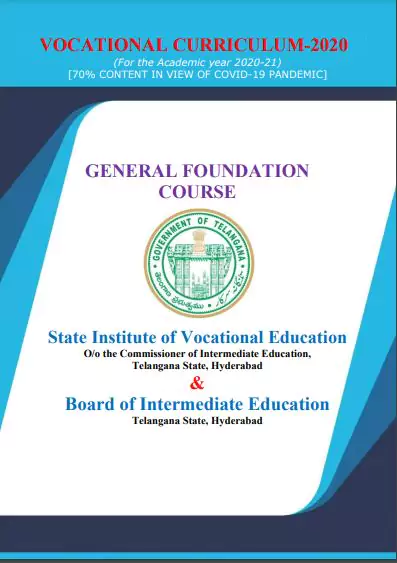‘Intermediate Vocational Course’ PDF Quick download link is given at the bottom of this article. You can see the PDF demo, size of the PDF, page numbers, and direct download Free PDF of ‘General Foundation Previous Year’ using the download button.
Intermediate Vocational Course Second Year General Book PDF Free Download

General Foundation Course
INTRODUCTION
Sustainable agricultural production is becoming a challenging task in view of depleting land & water resources, unpredictable climatic conditions, rising population growth rate and meeting the demand for food grain production.
However, the problem can be tackled by adopting intensification and diversification in agricultural systems and raising productivity levels through education, training, research, technology adoption and institutional support.
Farmer remains at the centre stage in the whole system and this entrepreneurship can be made more productive by developing his competency levels both in technical and managerial skills.
Trained manpower serves and acts as a guiding force in exploiting potentials in agricultural production in general and Agricultural Crop Production in particular.
The vocational initiative is an important link between education and production functions.
An emphasis is laid, therefore, on developing competencies among the students through the improvement of their skills – set.
The curriculum for a vocational course should contain ingredients such as (i) the selection of
competencies for on-the-job performance (ii) instructional programs on principles and elements of a particular study subject and for the development of skills to perform practical
activities and (iii) developing capabilities to start either an agricultural business or attain gainful employment.
Additional efforts are made for the value addition of the course syllabus in terms of adequate exposure to seed production & processing, micro irrigation, landscape designing, nursery management, Cooperative societies, etc., which will widen the scope of employability of students and throw open many job opportunities in different sectors.
The students who pass out the vocational courses at the 10+2 stage are likely to absorb themselves in various sectors or initiate their own agricultural businesses.
The present competency-based curriculum on Agricultural Crop Production offers possible employment opportunities and job descriptions giving details of responsibilities and skill sets required for efficient performance.
It will serve as a foundation in the organization of instructional programs for theory and practical classes and prepare instructional material such as book writing, poster and chart preparations, practical manuals / Audio visual aids, and even the production of video programs.
The competency-based curriculum on Agricultural Crop Production will also help in structuring apprenticeship training programmes and serve as a guide to employers with regard to measuring the competency of the students.
The focused practicals will also bridge the gaps between theory and practice.
Apart from the course content, it has also given information on possible requirements of laboratory equipment, workshop materials, farm implements, spraying equipment and other materials used as inputs in Agricultural Crop Production.
It also provides a list of collaborating institutions and on-the-job training sites, besides curriculum outlines for each OJT site.
The curriculum of “Agricultural Crop Production” will be useful to various agencies engaged in the implementation of vocational education and to those who are looking towards employing appropriate technical manpower.
It will also serve as a guide for curriculum development in sub-disciplines of the vocation
The students who undergo this Vocational course have a handful of practical experience
which helps them in exposure to Private Industry / Public Employment.
Objectives of The Course
To develop manpower with scientific knowledge and skills for sustainable Agricultural Crop Production.
To develop the capability for gainful employment.
To develop capabilities for the world of work service sector To provide the elements and principles of Agricultural Crop Production with reference to:
Climate and weather parameters including agro-climatic zones of the region
Soil characteristics of the region
Tillage practices
Irrigation water management including micro irrigation techniques
Dryland farming, Soil & Water conservation and watershed management
Manures and fertilizers
Efficient crops and cropping systems and Contingency crop planning
Plant protection – Pests, diseases, weed management, bio-control and IPM technologies
Nursery management and landscape designing
Production technology for the field, commercial and horticulture crops
Sustainable agriculture practices like farming systems
Organic farming
Harvest and post-harvest handling
Marketing guidelines
To address the issues of climate change
To develop all necessary skills in practical Agricultural Crop Production.
To develop abilities for the organization of farmers’ meetings, field days, crop seminars and other extension activities.
To train students for developing entrepreneurship in seed production and agro-input supply
To develop capabilities and competencies for agribusiness.
To provide knowledge about the functioning of cooperative societies.
To provide knowledge about credit facilities and supporting schemes.
To acquaint myself with farm accounting and record maintenance.
To develop competency in computing the cost of cultivation and balance sheet preparation.
To expose the recent developments in the fields of production, marketing, extension and ICTs
| Author | – |
| Language | English, Telugu |
| No. of Pages | 1421 |
| PDF Size | 30 MB |
| Category | Education |
| Source/Credits | tsbie.cgg.gov.in |
General Foundation Course Vocational PDF In Telugu Free Download
